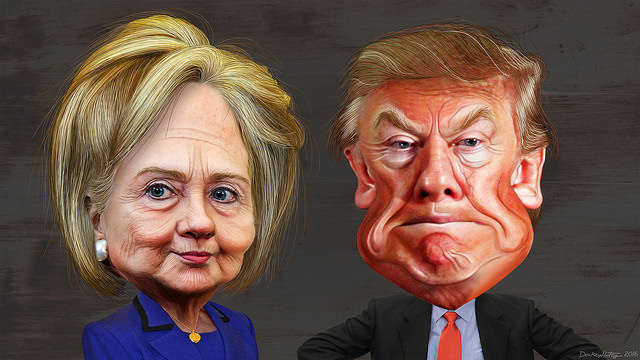Trump loses to Clinton in any test of character


The Pitt News' live blog for the third presidential debate. Photo by DonkeyHotey / Flickr.
Words used in a decade-old audio recording have had a profound impact on the trajectory of the presidential race — so much so that without my even spelling them out, you probably already know what I’m referring to.
The audio tape The Washington Post released on Oct. 8 revealed Republican presidential nominee Donald Trump in the midst of a flippantly crass discussion about sexually assaulting women. The reaction to the tape was immediate and intense with Trump’s polling numbers in national averages taking a nosedive. According to a survey NBC and the Wall Street Journal conducted Oct. 8 and 9, Trump faced an 11 point deficit nationally after the tapes emerged.
In any average presidential race, a major party nominee’s apparent approval of sexual assault would override most other voter considerations. But Trump supporters continue to shrug away Trump’s comments by comparing them to Clinton’s shortcomings — i.e. her “Crooked Hillary” reputation.
The truth is that Trump’s potentially criminal actions, specifically his abusive treatment of women, are far beyond his Democratic rival’s. Equating Trump’s moral and character failings with Clinton’s has more basis in sexist attitudes than reality.
The revelation that Trump holds less-than-savory opinions about women and a history to match it fits with what close observers already knew about the candidate’s personality. Even during the Republican primary elections, conservative outlets including National Review apprehensively noted the candidate’s unhealthy self-regard, his penchant for abuse of power and general temperamental unfitness for the highest office in American government.
Combined with what most already knew about Trump’s unabashed bigotry, it might seem strange that this most recent revelation was what finally pushed some Trump supporters over the edge.
Conservative pundit Charles Krauthammer offered a list of what he saw of as equally disqualifying aspects of Trump in a column last week for the Washington Post, including “habitual mendacity, pathological narcissism, profound ignorance and an astonishing dearth of basic human empathy.”
While none of those claims about Trump’s character are untrue, there is still an important distinction worth making between criticism of Trump as a private person and as a public persona. Krauthammer’s breakdown points to a weak, bad candidate, but the fallout following the release of the 2005 tape and the ensuing flood of sexual assault allegations against Trump suggest that a potential criminal is running for president.
These aren’t just comments on his personality — they’re personal character flaws relevant to choosing a national leader.
There’s an obvious response to this critique of Donald Trump, and the reality TV star’s campaign has repeated this response well past the point of being rational or even intelligible: Hillary Clinton is the true criminal and should be in jail. Additionally, in light of ballooning difficulties for his chances with female voters, Trump chose to focus on attacking Clinton for her husband’s numerous sexual indiscretions.
While the very idea that Clinton’s actions with respect to her husband’s sexual assault accusers could rank on the same level with Trump’s real, pervasive and practiced sexism is laughable, the strategy has nevertheless worked to a point. The common wisdom about Trump and Clinton is that “to elect either would be a moral disaster.”
Trump’s allegations that Clinton “viciously” attacked women who accused her husband of assault are unsubstantiated at best and in some cases are actually contradicted by the women involved.
In one instance, Juanita Broaddrick, who accused Bill Clinton of rape in 1978 while Bill was governor of Arkansas, reported that Hillary Clinton approached her at a fundraiser shortly after the event to ostensibly offer her thanks for “the things you do for him.” While a cynical take on the episode might potentially suggest coercion, evidence is slim that Hillary Clinton knew anything about her husband’s assault at the time and her words on their own hardly suggest anything ominous.
But that isn’t keeping Trump from crudely taking advantage of the story for political gain.
Sexism and a gender bias compose a running similarity between most character assassinations directed at Clinton. The Democrat’s continuing struggle with the character “issue” of likeability are shamefully conflated to be on par with real character flaws. Concerns about the candidate’s truthfulness and perceived secretiveness are somewhat better-founded. But it’s important to note that much of the reason for the candidate’s reluctance to engage with the media stems from aggressive, accusatory and potentially prejudiced press coverage that began with her emergence on the national political stage a quarter-century ago and hasn’t stopped since.
Much of the criticism involving Clinton’s personality has been based on what critics call her cold, unemotional personality. Again, this isn’t necessarily untruthful, but it’s not a disqualifier for holding the top position in the country.
This isn’t to say that Hillary Clinton has no character issues — she is, after all, a human being. What’s shocking is the degree to which national media and voters’ consciousness have internalized the absurd belief that Clinton’s missteps are in some way equivalent to Donald Trump’s outrageous abuse of people, be they his ex-wives, contestants in his beauty pageants or those small businesses unfortunate enough to hold contracts with his sham of a business.
Character matters, and, despite her human flaws, Hillary Clinton has the character of a president. Revelations about Trump’s character from the past few weeks have shown beyond the shade of a doubt that his is utterly unacceptable.
This presidential election is a choice less of policy than of character. One candidate’s flaws are human — the other’s are disqualifying.
Henry primarily writes about government and domestic policy for The Pitt News. Write to Henry at hgg7@pitt.edu.
Recent Posts
SGB introduces new governing code bill and addresses rumors of ICE on campus
At its weekly meeting at Nordy’s Place on Tuesday, Student Government Board introduced an omnibus…
Opinion | School should be in the summer
Although this may be controversial, I believe that from this data, it is evident that…
Weathering the storm: Pittsburgh teams have tackled some of the toughest environments
The end of the year in western Pennsylvania is always marked by two things —…
Notes From an Average Girl // Notes on Book Banning
In this edition of Notes From an Average Girl, senior staff writer Madeline Milchman writes…
To Be Honest // Yup, it is that damn phone
In this edition of To Be Honest, staff writer Evin Verbrugge writes about her phone…
Meaning at the Movies | Portraying Toxic ‘Adolescence’
In this edition of Meaning at the Movies, staff writer Lauren Deaton explores the mini-series…


